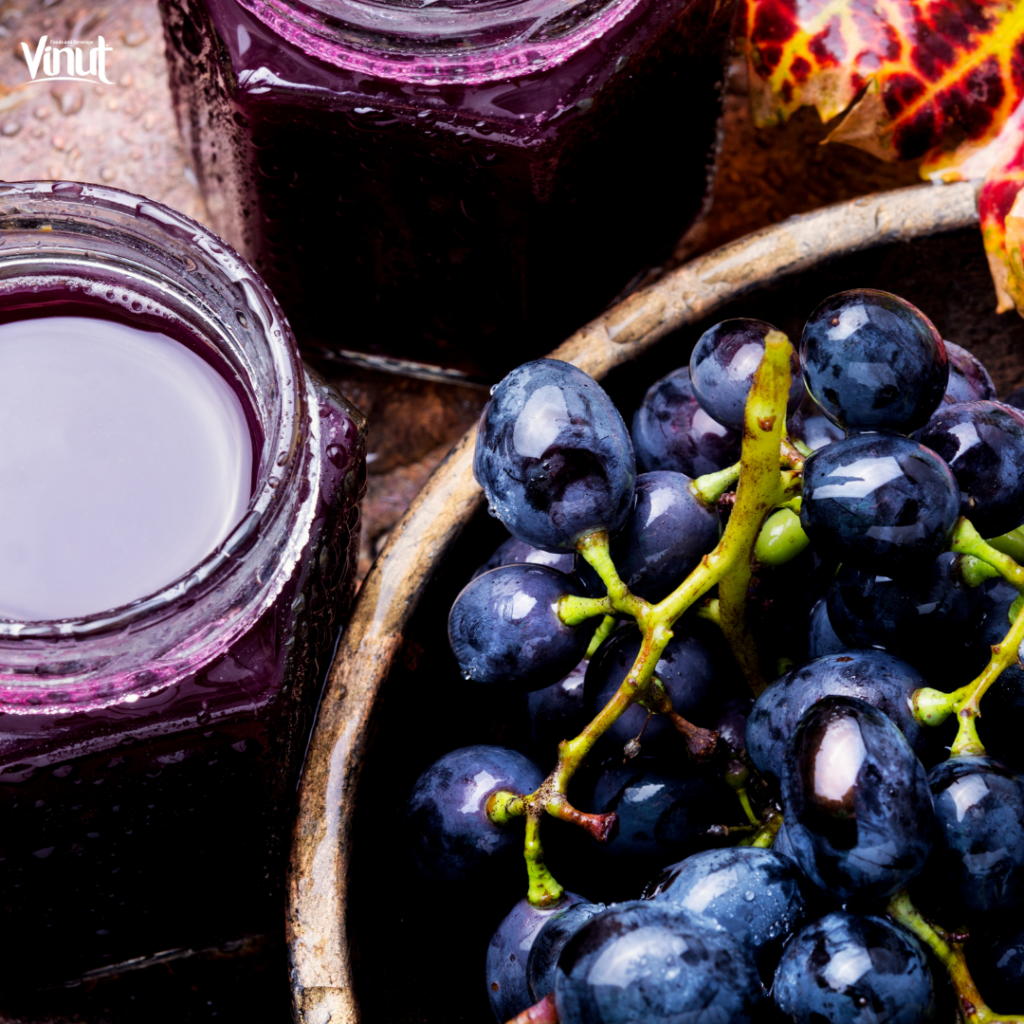
News
Discover the Health Benefits of Grape Juice

Grape juice is more than just a delicious beverage. It’s a powerhouse of nutrients and antioxidants that offer a wide range of health benefits. From supporting heart health to boosting the immune system, grape juice has been celebrated for its therapeutic properties for centuries. In this article, Cojo Cojo will dive deep into the health benefits of grape juice, exploring how it can enhance your overall well-being and why you should consider incorporating it into your daily diet.

Table of Contents
1. Rich in Antioxidants Grape Juice
The Power of Polyphenols
Grape juice is loaded with polyphenols, a type of antioxidant that plays a crucial role in protecting your body from oxidative stress. These antioxidants neutralize free radicals, unstable molecules that can damage cells and contribute to aging and chronic diseases. The most notable polyphenol in grape juice is resveratrol, which has been linked to a variety of health benefits, including reducing inflammation and lowering the risk of heart disease.
Flavonoids and Their Benefits
In addition to polyphenols, grape juice contains flavonoids, another group of powerful antioxidants. Flavonoids help improve blood circulation, reduce the risk of blood clots, and support overall cardiovascular health. Regular consumption of grape juice can significantly increase your body’s antioxidant levels, providing long-term protection against various health conditions.

2. Supports Heart Health
Lowering Blood Pressure
One of the most well-documented benefits of grape juice is its ability to support heart health. The antioxidants in grape juice, particularly resveratrol, have been shown to help lower blood pressure. By relaxing the blood vessels and improving blood flow, grape juice can help reduce the strain on your heart, lowering the risk of hypertension and related cardiovascular issues.
Reducing Cholesterol Levels
Grape juice can also help lower LDL (bad) cholesterol levels while increasing HDL (good) cholesterol. This balance is essential for maintaining a healthy heart. The flavonoids in grape juice prevent the oxidation of LDL cholesterol, which is a key factor in the development of atherosclerosis, a condition characterized by the hardening of the arteries.
Improving Blood Vessel Function
The resveratrol in grape juice enhances the production of nitric oxide, a molecule that helps blood vessels relax and dilate. This improves circulation and reduces the risk of blood clots, which can lead to heart attacks and strokes. By promoting better blood vessel function, grape juice contributes to overall cardiovascular health.
3. Boosts Immune System
Vitamin C and Immune Support
Grape juice is a rich source of vitamin C, a vital nutrient for a healthy immune system. Vitamin C boosts the production of white blood cells, which are essential for fighting off infections and illnesses. Drinking grape juice regularly can help strengthen your immune system, making you less susceptible to colds, flu, and other common ailments.
Antibacterial and Antiviral Properties
The natural compounds in grape juice, such as resveratrol and other polyphenols, have been shown to possess antibacterial and antiviral properties. These compounds help your body fend off harmful pathogens, further enhancing your immune defenses. Including grape juice in your diet can provide an additional layer of protection against infections.

4. Aids in Digestion
Rich in Dietary Fiber
Grape juice contains dietary fiber, which is essential for maintaining healthy digestion. Fiber adds bulk to your stool, making it easier to pass and preventing constipation. It also supports the growth of beneficial gut bacteria, which play a crucial role in digestive health.
Promotes Gut Health
The polyphenols in grape juice act as prebiotics, feeding the good bacteria in your gut. A healthy gut microbiome is linked to better digestion, improved nutrient absorption, and even a stronger immune system. Drinking grape juice can help maintain a balanced gut environment, contributing to overall digestive health.
5. Supports Brain Health
Cognitive Function and Memory
Research suggests that the antioxidants in grape juice, particularly resveratrol, may help improve cognitive function and memory. These antioxidants protect brain cells from damage caused by free radicals, reducing the risk of neurodegenerative diseases such as Alzheimer’s and Parkinson’s.
Enhancing Blood Flow to the Brain
Grape juice has also been shown to improve blood flow to the brain, which is essential for cognitive health. Better circulation ensures that your brain receives the oxygen and nutrients it needs to function optimally. Regular consumption of grape juice may help maintain mental sharpness as you age.

6. May Help Prevent Cancer
Anti-Cancer Properties of Resveratrol
Resveratrol, one of the key antioxidants in grape juice, has been extensively studied for its potential anti-cancer properties. This compound has been shown to inhibit the growth of cancer cells and prevent the spread of tumors in various types of cancer, including breast, colon, and prostate cancer.
Flavonoids and Cancer Prevention
The flavonoids in grape juice also contribute to its cancer-fighting potential. These antioxidants protect cells from DNA damage, reduce inflammation, and inhibit the formation of cancer-causing compounds. While more research is needed, the evidence suggests that drinking grape juice may help reduce the risk of certain cancers.
7. Improves Skin Health
Hydration and Skin Elasticity
Grape juice is a natural source of hydration, which is essential for maintaining healthy, glowing skin. The antioxidants in grape juice also help protect your skin from damage caused by UV rays and environmental pollutants. Regular consumption of grape juice can improve skin elasticity, reduce the appearance of wrinkles, and promote a youthful complexion.
Anti-Aging Benefits
The resveratrol and flavonoids in grape juice have powerful anti-aging effects. These antioxidants help neutralize free radicals that cause premature aging, keeping your skin looking young and vibrant. Incorporating grape juice into your daily routine can help slow down the aging process and maintain healthy skin.

8. Supports Weight Management
Low in Calories
Grape juice is naturally low in calories, making it a great choice for those looking to manage their weight. A glass of grape juice can satisfy your sweet cravings without adding too many calories to your diet. It’s a healthier alternative to sugary sodas and other high-calorie beverages.
Boosts Metabolism
The antioxidants in grape juice, particularly resveratrol, have been shown to boost metabolism and increase fat burning. This can help you maintain a healthy weight and prevent obesity-related health issues. Drinking grape juice as part of a balanced diet and active lifestyle can support your weight management goals.
9. Supports Eye Health
Rich in Vitamin A
Grape juice contains vitamin A, which is essential for maintaining good vision and eye health. Vitamin A helps protect the cornea, the eye’s outermost layer, and supports the function of the retina, which is responsible for detecting light and sending visual signals to the brain.
Protects Against Age-Related Eye Diseases
The antioxidants in grape juice, particularly resveratrol, can help protect your eyes from age-related conditions such as macular degeneration and cataracts. These conditions are often caused by oxidative stress and damage to the eye’s cells, which can be mitigated by the antioxidants found in grape juice.
10. Promotes Heart Health
Improves Circulation
Grape juice has been shown to improve circulation by promoting the production of nitric oxide, a molecule that helps blood vessels relax and dilate. This improves blood flow and reduces the risk of blood clots, which can lead to heart attacks and strokes.
Reduces Blood Pressure
The polyphenols in grape juice, particularly resveratrol, have been shown to help lower blood pressure. By relaxing the blood vessels and improving blood flow, grape juice can help reduce the strain on your heart, lowering the risk of hypertension and related cardiovascular issues.
Conclusion
Grape juice is a delicious and nutritious beverage that offers a wide range of health benefits. From supporting heart health to boosting the immune system, aiding digestion, and promoting brain function, grape juice is a powerful addition to any diet. Whether you enjoy it on its own or as part of a balanced meal, grape juice is a great way to enhance your overall well-being.
